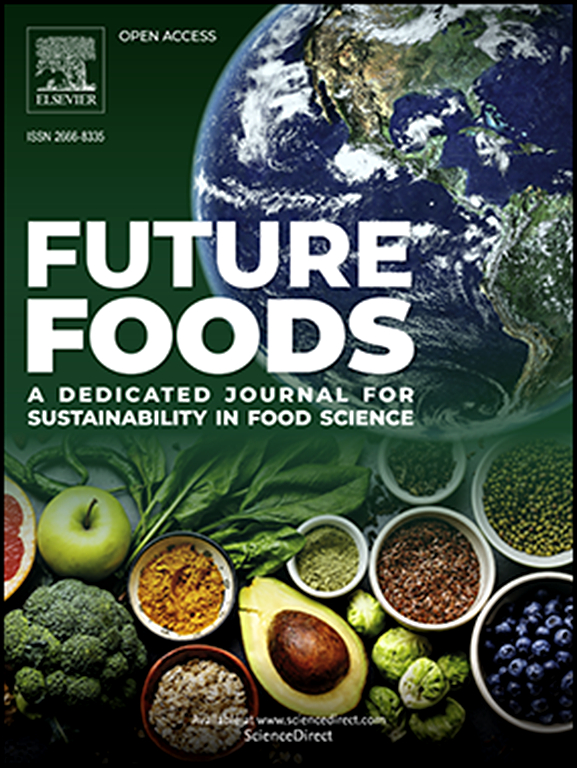Yeast-based precision fermentation for the biosynthesis of terpenoids
IF 8.2
Q1 FOOD SCIENCE & TECHNOLOGY
引用次数: 0
Abstract
Terpenoids represent the largest class of specialized metabolites with extensive applications in food and nutraceutical industries. While plant-derived extraction remains the predominant industrial source, this traditional approach faces significant challenges including low yields, environmental variability, and substantial resource requirements. Yeast-based precision fermentation has emerged as a compelling alternative production platform, effectively addressing these constraints through distinct advantages including rapid growth kinetics, environmental condition independence, and superior genetic tractability. This review scrutinizes recent developments in yeast-based precision fermentation for terpenoid production, with emphasis on food-related applications. We discuss key yeast platforms such as Saccharomyces cerevisiae, Komagataella phaffii, Yarrowia lipolytica, and Candida tropicalis, analyze their distinct advantages as production hosts, and explore synthetic biology approaches for strain development. Through representative case studies of mono-, sesqui-, di-, and triterpenoid production, we illustrate the practical implementation of the synthetic biology approaches and highlight exceptional achievements in production metrics. Finally, this review examines emerging methodologies for expanding the repertoire of producible terpenoids through functional metagenomic screening and synthetic pathway construction for noncanonical building blocks. This comprehensive analysis provides insights into the current state and future directions of yeast-based precision fermentation for sustainable terpenoid production.
以酵母为基础的萜类生物合成的精密发酵
萜类化合物是一类特殊的代谢物,在食品和营养保健工业中有着广泛的应用。虽然植物提取仍然是主要的工业来源,但这种传统方法面临着重大挑战,包括低产量、环境变化和大量资源需求。基于酵母的精密发酵已经成为一种令人信服的替代生产平台,通过独特的优势,包括快速生长动力学,环境条件独立性和优越的遗传可追溯性,有效地解决了这些限制。本文综述了以酵母为基础的萜类化合物精密发酵生产的最新进展,重点介绍了与食品相关的应用。我们讨论了主要的酵母平台,如酿酒酵母、法菲Komagataella phaffii、解脂耶氏菌和热带假丝酵母,分析了它们作为生产宿主的独特优势,并探索了菌株发育的合成生物学方法。通过对单萜、半萜、二萜和三萜生产的代表性案例研究,我们说明了合成生物学方法的实际实施,并强调了生产指标方面的卓越成就。最后,本文回顾了新兴的方法,通过功能宏基因组筛选和非规范构建块的合成途径构建来扩大可生产萜类化合物的曲目。这一全面的分析提供了对基于酵母的可持续萜类化合物生产的精密发酵的现状和未来方向的见解。
本文章由计算机程序翻译,如有差异,请以英文原文为准。
求助全文
约1分钟内获得全文
求助全文
来源期刊

Future Foods
Agricultural and Biological Sciences-Food Science
CiteScore
8.60
自引率
0.00%
发文量
97
审稿时长
15 weeks
期刊介绍:
Future Foods is a specialized journal that is dedicated to tackling the challenges posed by climate change and the need for sustainability in the realm of food production. The journal recognizes the imperative to transform current food manufacturing and consumption practices to meet the dietary needs of a burgeoning global population while simultaneously curbing environmental degradation.
The mission of Future Foods is to disseminate research that aligns with the goal of fostering the development of innovative technologies and alternative food sources to establish more sustainable food systems. The journal is committed to publishing high-quality, peer-reviewed articles that contribute to the advancement of sustainable food practices.
Abstracting and indexing:
Scopus
Directory of Open Access Journals (DOAJ)
Emerging Sources Citation Index (ESCI)
SCImago Journal Rank (SJR)
SNIP
 求助内容:
求助内容: 应助结果提醒方式:
应助结果提醒方式:


